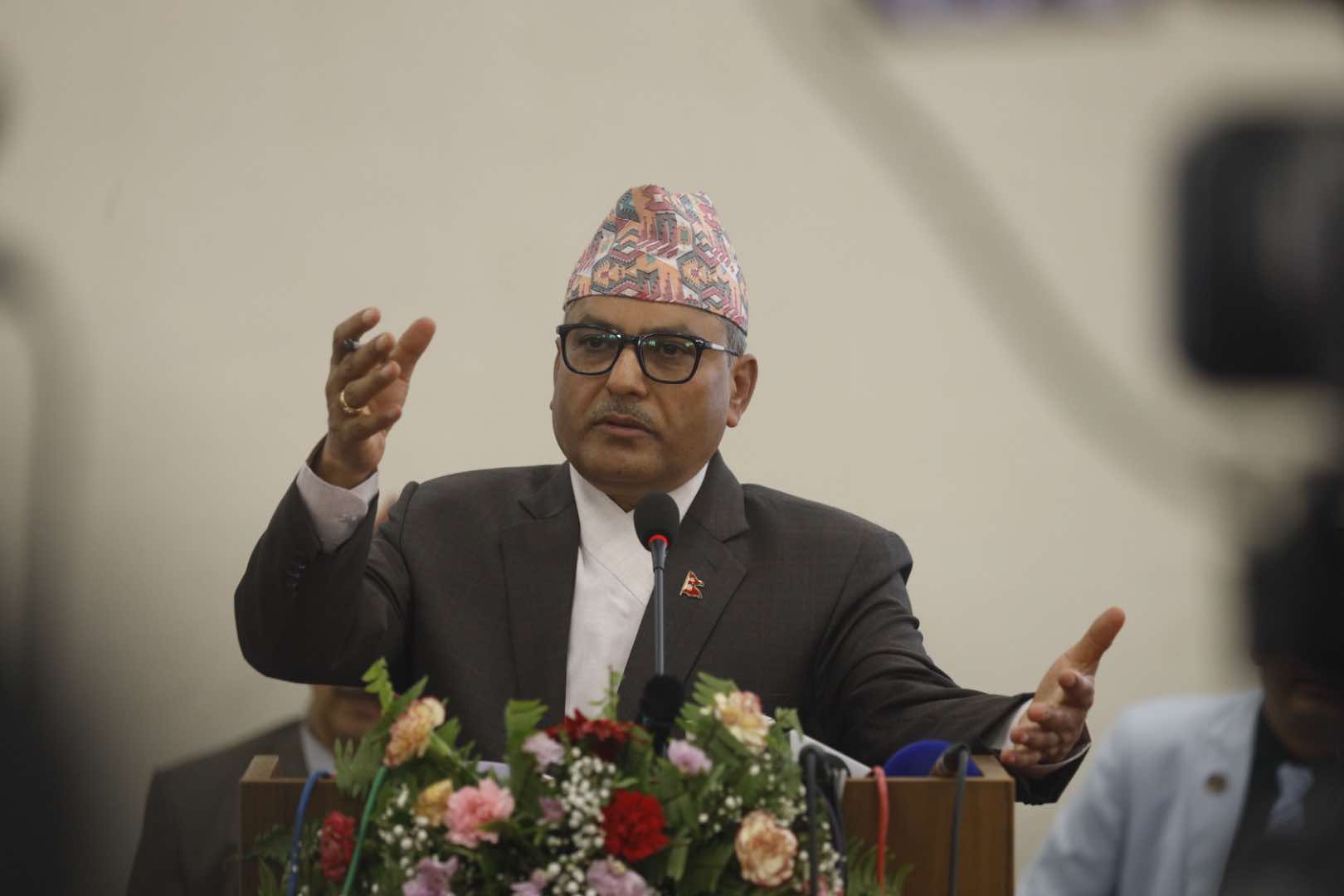Legitimate Path to Transitional Justice: Amendment of Laws, Only After Appointment of Officials
We use Google Cloud Translation Services. Google requires we provide the following disclaimer relating to use of this service:
This service may contain translations powered by Google. Google disclaims all warranties related to the translations, expressed or implied, including any warranties of accuracy, reliability, and any implied warranties of merchantability, fitness for a particular purpose, and noninfringement.


The government should not go astray on the issue of transitional justice! Don't destroy the atmosphere of trust! Let the process of appointing the commissioner begin only after the amendment of the existing law is completed! The government should understand and implement the orders of the Supreme Court not individually, but collectively! Let's find a lasting solution to the transitional justice! It is illegal to have to challenge the government's actions in the courts time and again. This has been the request of mainstream human rights defenders and victim communities.



Fifteen human rights organizations, including the Accountability Monitoring Committee, which has been raising voices for a credible transitional justice process since the signing of the Greater Peace Memorandum, expressed their serious concern about the latest development. Especially regarding the implementation of the Supreme Court's last order of January 15th, he met the Law Minister, Attorney General and Law Secretary on the 19th of Chaitra and urged them to understand the overall meaning of the judicial orders and to find a lasting solution to the ongoing transitional justice process.
In the past, the precedents and principles established in the case of Rajendra Dhakal (order date: 2064 June 18), including Madhav Basnet for Jury Nepal (order date: 2070 Paush 18) and Suman Adhikari (order date: 2071 Falgun 14) are a jurisprudential way to decide transitional justice. The route was drawn. But it was not followed for years. Legal management according to the roadmap, ensuring the independence, autonomy and competence of the commissions did not work. The appointment was politicized . Commissions became useless. In this background, the victim community has been constantly knocking the doors of the Supreme Court to challenge the government's decisions and behavior that are against the interests of the victims. Taking such cases brought to the Supreme Court by the victims or human rights activists as an opportunity, the Supreme Court seems to be making critical comments about the government's failure to smooth the transitional justice process by making legal arrangements in accordance with the previous orders.
Dated 15th January 2080, the joint bench including Gyanendra Aran (079-WO-1457) The order issued is the latest link of the same. In the order, the attention of the government and the parliament has been drawn to complete the work of amending the law as soon as possible. The bench said in its order: "It cannot be considered proper and appropriate not to amend the law even for a very long period of time after years of guidance have passed by this court" (Chapter 29). It is also necessary to get the attention of the government, the office of the Prime Minister and the Council of Ministers, the Government of Nepal, the Ministry of Law, Justice and Parliamentary Affairs and the Federal Parliament. (Chapter 30)
In addition to that, the bench seems to have taken seriously the situation that the commissions will remain without officials forever and the employees will also remain without achievements, and issued the following order regarding the appointment of officials and the role of employees:
An order will be issued in the name of the Office of the Prime Minister and Council of Ministers of the Government of Nepal to complete the work of forming the committee and start the appointment process for the appointment of the officers of the Inquiry Commission.
"Within 15 days of receiving the order, in order to ensure and protect the right of justice and to ensure and protect the right of justice of the victims, the representatives of the organizations of the victims of the armed conflict and the secretaries of both commissions, in the absence of officials, the secretary of the commission will form a working team and create a victim-friendly environment for the initial investigation. The Government of Nepal will send a written letter to the Prime Minister and Council of Ministers' office to make necessary and appropriate arrangements to start the work. (Chapter 42)
Divided opinions have been expressed by the victims regarding the said order . Some have demanded to start the appointment process only under the revised provisions after the work of amending the law is completed in accordance with the precedents and principles established in Suman Adhikari's case. Also, in view of the depth of the initial investigation, it seems that the argument cannot be carried out by the staff in the absence of the commissioners . Some of the victims have asked the government to form a recommendation committee for the appointment of officials under the existing law and conduct a preliminary investigation from the staff level as written in the order. Meanwhile, the news has been published that the government of Nepal has decided to start the process of appointing officials (to form a recommendation committee) without finalizing the amendment of the order based on a unilateral understanding of the order. It is seen that the state of mind of the government officials is changing. In order to provide a lasting solution to the transitional justice process, the government, ruling and opposition political parties should intensify efforts to amend the law, so it is worrying to try to move forward under the guise of the existing law.
It seems that the overall intention of the latest judgment given in the case of Gyanendra Aran is that the previous orders should be properly implemented, the law should be quickly amended and the transitional justice process should be concluded reliably . However, the spirit that is felt in the overall study of the judgment does not seem to be reflected in the language of the order. This seems to cause a problem in understanding . But the government does not have the freedom to run away from the basic responsibility of transitional justice management by applying a superficial meaning without absorbing the balanced and relevant understanding of the order or to move forward by leaning on the inadequate and controversial existing law. One should be honest about the obligation to execute the subsequent orders in totality which are interconnected with the previous orders.
What should be kept in mind is that the bill under consideration in the parliament is aimed at the implementation of the orders including Suman Adhikari. All the recent judicial orders that have come are the result of non-compliance of the previous orders. The latest decision of the Joint Bench cannot prevail over the leading example (including Suman Adhikari) of the Full Bench . The effectiveness of the commission is also a question that has been tried to be resolved in the Gyanendra Aran case. It is interdependent with the matter raised in Suman Adhikari's case. Therefore, it is retrograde to start the process of appointing officials after the amendment of the law. Doing so would in turn violate previous orders seeking a credible transitional justice process.
Leaving aside the original question that has not been addressed, how does appointing another commissioner get legitimacy? How can it give meaningful results ? Considerable. Appointing a commissioner is the only solution and ? Who doesn't know how the achievements of the two commissioners appointed according to the existing law have been? Didn't the commissions often complain about not being able to work because of the amendment of the law? If we are to be sincere in providing a lasting solution to the transitional justice process, it is necessary to get rid of the mindset of mechanical execution of judicial orders. From Rajendra Dhakal to Gyanendra Aran, we should go for an option that adequately addresses the overall meaning and sentiment of the orders. The government should not go astray . Must be guided by 'holistic approach'.
It would be ironic to repeat the same situation that caused the transitional justice process to be "derailed" in the past . Only the revision and finalization of the amendment bill under consideration in the parliament, which is gradually gaining legitimacy, will pave the way for the observance of all judicial precedents and principles.
When studying the latest judgment, it is seen that the fact that the amendment bill is under consideration was generally taken into account by the bench. However, the subject of Section 3 of the Act (composition of the commission and selection process of the commissioner) was recently discussed in the parliament. The demand of the victim community is that the executive should not dominate the committee formation and the appointment process should be transparent, consultative and participatory.
Accordingly, the latest report on the bill shows that the proposal to amend the law has been generated in the committee and consensus is being maintained. If the bench had considered the 'dynamics' of the discussion on the bill, perhaps the order would have been different. After the amendment of the law was decided by the Parliament, there would have been an order to start the appointment process immediately. Also, while choosing the language of the order, it would be good if the expected vision could be reached in the overall meaning of the previous precedents, the principle of separation of powers, practical suitability, multifaceted aspects of transitional justice and sensitivity. It is counterproductive to seek to make the said judicial weakness a lisno . It is necessary to understand the essence of the collective orders and find a way to implement them legitimately .
Now let's discuss the second order used in the latest judgment (including Gyanendra Aran, 079-WO-1457). It has two contents . Based on "consultation" with the representatives of the organizations of people who suffered from the first conflict and the secretaries of both commissions, and on the basis of the second consultation, the secretary of the official commission will form a working team and make "necessary and appropriate arrangements" so that the work of the preliminary investigation can be "started".
Looking at the overall architecture of the existing investigation of missing persons, truth-telling and reconciliation commission act, 2071, it does not seem that the legislature has allowed the investigation to be done in the absence of the commissioner. In the light of the Preamble of the Act, Section 2 (b), Section 3, Section 9, Section 13, Section 14, Section 31, Section 33, Section 34 and Section 42 and the regulations made under the Act, it seems that the investigation of the violation can only be under the authority of the Commission officials . It does not seem possible to change the limits and scope of the Secretary's authority regarding the investigation from the executive level. The Act itself does not seem to categorize infringement investigations as "preliminary" and "comprehensive". The preliminary investigation is mentioned in the regulations. But that is undefined .
Therefore, in the absence of the commissioner, it should be understood that even the matter of making "necessary and appropriate arrangements" by ordering a preliminary investigation of the violation from the level of staff is seeking parliamentary action . It is not justified to create an exception to the Act on the basis of an executive decision or an order that falls within the jurisdiction of the legislature. Conducting preliminary investigation in the absence of the commissioner does not seem to gain legitimacy from the victim community itself.
There may be other legitimate options that address the core spirit and spirit of the court's order that employees are not without a role . It does not mean that the government cannot take initiative in that direction . You have to find a trick that 'even a snake dies and a stick does not break'. Such as 'clustering' complaints based on the occurrence and nature of the violation even in the absence of the commissioners, preparing thematic briefing papers for the commission, preparing fact sheets by studying the comparative experience of other countries, studying and surveying the needs of the victims, identifying and analyzing the causal factors of the conflict, Searching for ways to ensure that the conflict does not recur, looking for ways to increase the constructive role of the province and local level in terms of reconciliation, The absence of commissioners does not make a difference to reach out among victims of a special nature (such as victims of sexual violence) and spread awareness about access to transitional justice/justice and study ways to address their problems. This creates a supportive environment for the commissioners who will be appointed later to carry out the work according to the mandate. At the end of the
, there is a request that the government should learn from the past mistakes. There should be a serious review as to why the transitional justice process was "derailed" a decade ago and why it has not yet returned to the leak. Commissioners have been appointed twice in the past. A waste of valuable time and resources. But that's where the problem lies. No achievement could be achieved . After learning from that mistake, it would be foolish to walk the opposite way and repeat the same mistake even after a decade .
Therefore, it is necessary to focus the energy of the government, the ruling parties and the main opposition on the pending amendment bill. The government should have a meaningful consultation with the stakeholders regarding the latest judicial developments, bills pending in the parliament and the steps the government should take immediately. The environment of trust should be further strengthened .
As specified by the Supreme Court's order in Suman Adhikari's case, the bill registered by the government for the purpose of amending the law is under consideration in the parliament, the proposals for the amendment of the provisions related to the composition of the recommendation committee and the selection process of officials are under discussion, and the commission's work on the amendment of the law has been completed. The government can honestly inform the Supreme Court about the government's readiness to start the process of selection of officials. Also, the Supreme Court can inform the Supreme Court that the consultation with the stakeholders has started on the matter of conducting preliminary investigation from the staff level and based on the results of the consultation, it will proceed by making a solid opinion. There is no contempt if the government informs the court about the status of execution of the judgment at the right time . It is a different matter if it is used as a pretense of contempt to fulfill some other purpose.
(Advocate Chapagai is the coordinator of the accountability monitoring committee . Journalist Kurinkel and advocate Maharjan are co-coordinators .)
 प्रकाशित : चैत्र २०, २०८० २१:०२
प्रकाशित : चैत्र २०, २०८० २१:०२

 २६.१२°C काठमाडौं
२६.१२°C काठमाडौं
















